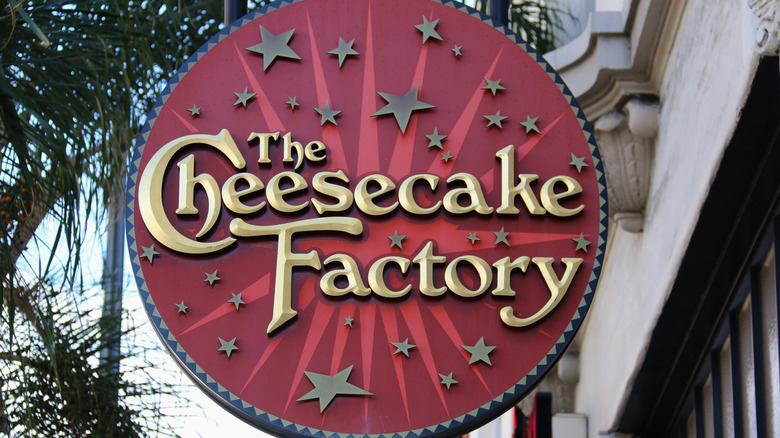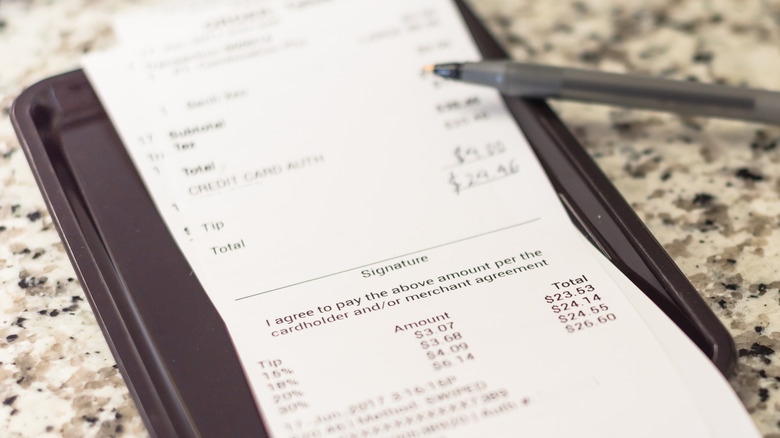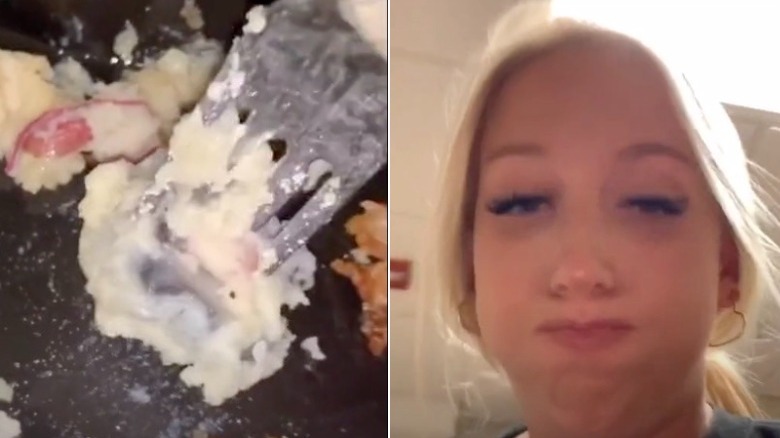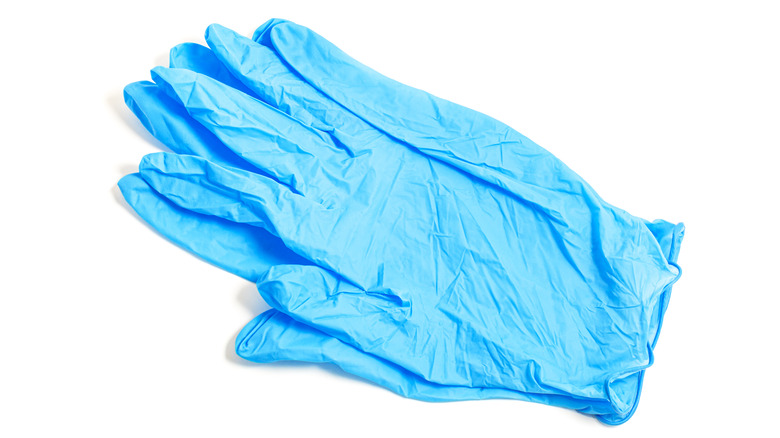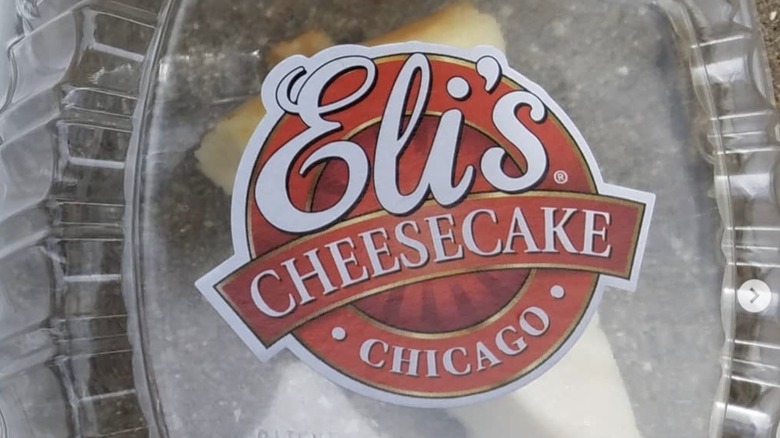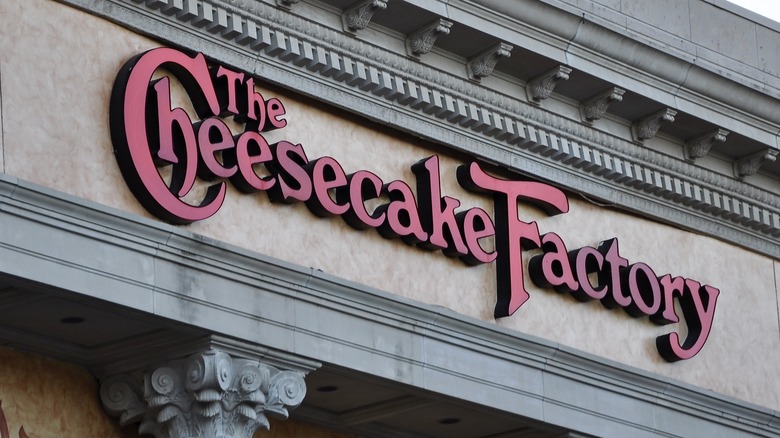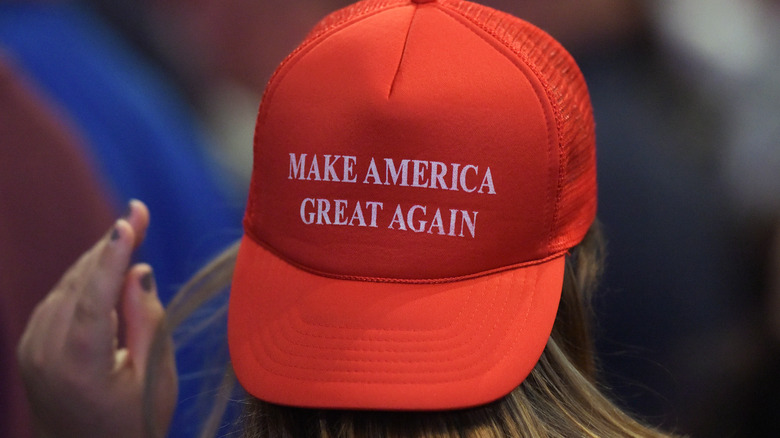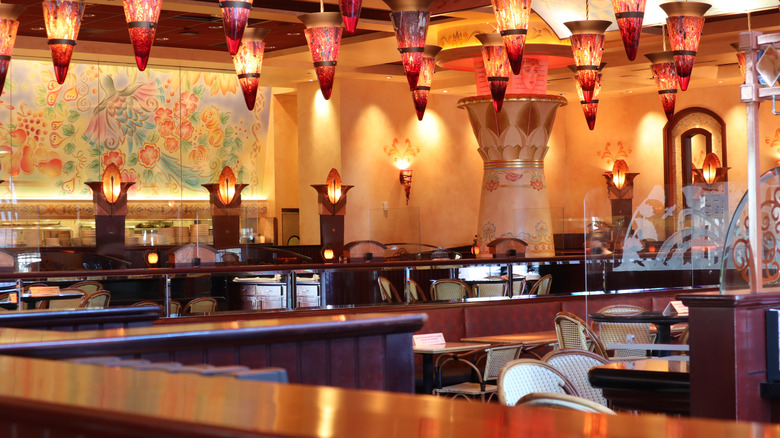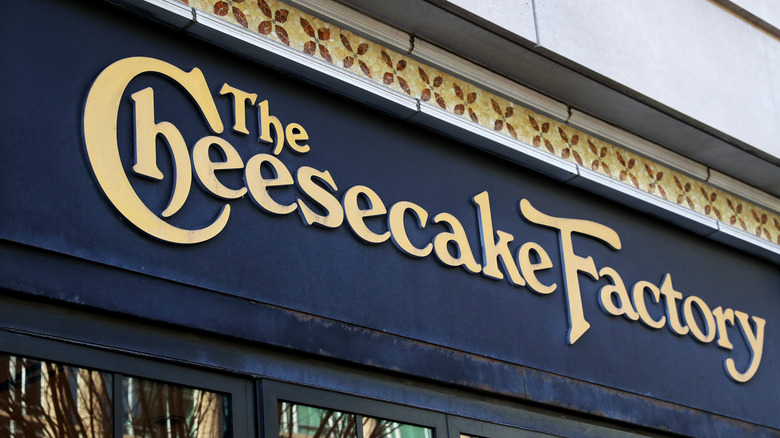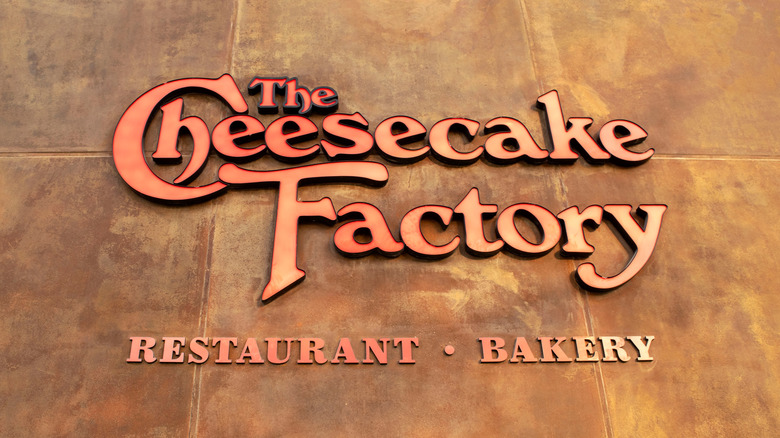Scandals The Cheesecake Factory Will Never Live Down
There are a lot of sit-down chain restaurants in the United States, but few are willing to go as all-in on so many aspects of the dining experience as The Cheesecake Factory. That's because everything about The Cheesecake Factory is big. The restaurants themselves, usually towering over a suburban shopping plaza or attached to a gigantic high-end shopping mall, are huge, for starters. The inside of each location is typically loaded with eye-popping, faux-classical decor, including some very impressive columns. And then there's the menu, which is as long as a novel and as disparate as a phone book, offering an example of nearly every popular cuisine, and all in portions big enough to comfortably feed a whole family. But this is to say nothing of the chain's namesake cheesecakes, which prove to be works of highly engineered sugar and dairy architecture.
The Cheesecake Factory's unbridled rejection of austerity and moderation has made it a very popular chain. Yet popularity can often complicate things, as more locations, increasingly complex moving parts, and growing attention can lead to problems. And sometimes those problems, like everything else associated with The Cheesecake Factory, can be way bigger than they ever really needed to be. Here are all the times that the restaurant chain has faced scandals and controversies that have been hard to shake, to the point that The Cheesecake Factory may never live them down.
The Cheesecake Factory tricked customers into leaving huge tips
Up to 2017, according to Buzzfeed News, the Cheesecake Factory was accused of some seriously underhanded mathematical tactics that allegedly tricked customers into leaving much bigger tips than they would otherwise. When asked to split the total check between mutual parties — a common occurrence at the Cheesecake Factory, which often sees especially big groups dining out together for special occasions — the restaurant would do so readily. But then each bill had a "suggested gratuity" listed. The problem with that is that this suggestion was not a standard tip of 15 to 20 percent of the customer's individual share of the bill, but a tip calculated based on the entire check. The suggested tip sometimes ran as high as 30 to 44 percent.
Cheesecake Factory customer Marcel Goldman claims to have been suckered by the "suggested tip" practice, unwittingly leaving a 40 percent tip of $15.40 on one visit. He decided to sue after his letter to The Cheesecake Factory's corporate office seeking to correct this "billing error" was ignored. In a statement to Buzzfeed News in the wake of Goldman's suit, Cheesecake Factory spokesperson Althea Rowe put the blame squarely back on the shoulders of the customer. "All gratuity amounts listed on our guest checks are suggestions only. Guests are free to tip as they please." It's not clear how the case ended, but Goldman's attorneys did discover that Cheesecake Factory had practiced the "suggested tip" idea from 2013 to 2017.
A cheesecake giveaway was not a piece of cake for The Cheesecake Factory
Cheesecake Factory cheesecake is a premium product on the pricey side — a single slice costs about $8, according to Fast Food Menu Prices. So, when the restaurant offered this high-quality dessert for zero dollars, diners were moved to action, a rush that soon enough turned into a chaotic ordeal.
According to People, the Cheesecake Factory celebrated its 40th anniversary in December 2018. To mark the occasion, the chain partnered with delivery service DoorDash to give away a free slice of cheesecake to 40,000 people across its numerous U.S. locations. So many people jumped on their phones to get a free cheesecake that many outlets quickly ran out of the dessert, which was soon reflected on the restaurant's DoorDash order menu. "Now when I want to take advantage of your promotion for free cheesecake, it says currently unavailable on door dash!!" wrote one irate customer on Twitter. "your stores should be prepared for demand when you have a promotion like this."
Meanwhile, customers who tried to dine in at their local Cheesecake Factory found they couldn't get a table, or even gain entry into the restaurant in some cases. That's because the restaurants were packed with waiting DoorDash drivers, all while kitchen workers were stressed by the intense demand. A large crowd had gathered at a Cheesecake Factory location in Clarendon, Virginia, and police were called to the scene after a fight broke out inside, according to ARLNow.
What a customer thought was a frog in her order was worse
In April 2021, a woman identified only as Bethany went viral on TikTok for all the wrong reasons. In just over 24 hours, her video, issued under the handle @bethanybutwith2arms, accumulated more than 3.5 million views, according to The Daily Dot. It depicted Bethany eating a takeout order from The Cheesecake Factory, in which her side of mashed potatoes contained a malformed, darkly colored lump. She'd initially filmed it to share the bizarre moment with friends. "I thought it was funny, and then when I was washing it off and it appeared to be a frog — like I was shocked," Bethany told Newsweek.
But Bethany wasn't totally convinced that the mass was an amphibian. Taking advantage of her status as a college student, she sought out her campus's scientific lab facilities, where a professor ran some tests to find out the true nature of the lump. It wasn't a frog, though the results may have had Bethany wishing it was one after all. Instead, the mass was a chunk of black mold.
Bethany posted an update to her Cheesecake Factory saga to TikTok, sharing the news and noting that she'd suffered a sore throat since her fateful meal. "I think it might be because of mold," she said. In a statement to The Daily Dot, The Cheesecake Factory claimed to have contacted Bethany and was "very concerned," adding that the chain takes "food safety and sanitation very seriously."
A customer discovered a rubber glove in their Cheesecake Factory pasta
In July 2020, during a period of widespread shutdowns and safety measures all meant to limit the spread of the coronavirus, most restaurants switched to a takeout and delivery business model. According to Fox 11 Los Angeles, Laurie Graham placed an order for food from The Cheesecake Factory to be delivered to her hotel room in Santa Monica, California, where she was staying with her husband. His order of fettuccine Alfredo apparently came with an extra ingredient. "He took a bite and he thought it was hard chicken or some overcooked cheese," said Laurie. "[C]ome to find out, it was a latex glove that had been melted into the food."
This was especially unnerving for Graham as her husband is diabetic and was considered high-risk for contracting COVID-19 — a disease that, ironically enough, food service personnel tried to stem by wearing protective latex gloves. When Graham complained to the manager of the Cheesecake Factory location that sold her the fettuccine with a rubber glove inside it, they apologized and offered a $200 gift certificate. Meanwhile, The Cheesecake Factory's corporate office issued a statement in response. "We take food safety and sanitation very seriously and are committed to providing a safe dining experience to all of our guests," company Senior VP of Operations Spero G. Alex said. "We are also reaching out to the guest to express our sincere concern and to apologize for this failure in service."
The Cheesecake Factory sued for trademark infringement
The Cheesecake Factory's signature item on its expansive menu is, of course, its cheesecakes. After all, the place is named The Cheesecake Factory, pointing to the level of pride it takes in its decadent slices and cakes of the dessert staple. According to Justia, The Cheesecake Factory owns the trademarks to several phrases in relation to describing and marketing its many varieties of cheesecake. Among those cake titles are stalwarts like the Chocolate Raspberry Truffle, White Chocolate Lemon Truffle, White Chocolate Raspberry Truffle, and Triple Chocolate Brownie Truffle. Because The Cheesecake Factory owns the rights to those menu item phrases, no other cheesecake-based business operating in the United States can use those designations when naming or promoting their own desserts.
In 1998, The Cheesecake Factory headquarters got word that Eli's, a Chicago-based cheesecake bakery, had allegedly put three items on its menu that shared nearly identical names as similar offerings on The Cheesecake Factory menu. At Eli's, these were the White Chocolate Raspberry Truffle Cheesecake and Triple Chocolate Truffle. The Cheesecake Factory sent a cease-and-desist letter to Eli's, threatening to sue if they didn't stop using the trademarked names. Eli's responded by filing a lawsuit, claiming that it had not interfered with the Cheesecake Factory's trademarks. That, in turn, led the Cheesecake Factory to file a trademark infringement lawsuit. In the end, the Cheesecake Factory won the legal battle, though it may have lost some cred for coming out against a smaller company.
The Cheesecake Factory allegedly fired a server for calling out racism
Andrea Nichole Duenas began working at the Thousand Oaks, California branch of The Cheesecake Factory in 2008, according to NBC Los Angeles. All told, she worked there for about a decade, employed as a server and trainer until her de facto termination in May 2019. And what was her fireable offense? According to Duenas, she complained about a racially charged remark made by a manager as well as unfair work practices she believed to be racially motivated. In a filing with the Los Angeles Superior Court, Duenas reported that in late 2018, she overheard a white kitchen manager tell Latino kitchen staff to "give me fries stacked high and tall like the wall Trump is going to build." Duenas called the manager out, who she says gave a half-hearted and apparently insincere apology. Duenas also told superiors that she believed some of the Latino members of the kitchen crew had been led to work "off-the-clock more than ... Caucasian employees."
After expressing her concerns with two other managers and a Cheesecake Factory regional director, the offending manager was transferred to another Cheesecake Factory location and received no disciplinary action. As for Duenas, her work hours were suddenly cut and she was given an indefinite suspension, allegedly for misuse of a cheesecake coupon. And so, Duenas filed a wrongful termination lawsuit against the Cheesecake Factory.
Some employees confronted a customer in a MAGA hat
In May 2018, according to CBS News, Eugenior Joseph joined his girlfriend and her family at a Miami branch of The Cheesecake Factory. It was an uneventful meal, at least until a restaurant employee reportedly noticed that Joseph was wearing a red "Make America Great Again" cap, of a style worn by the most ardent supporters of President Donald Trump. That worker spread the word to her co-workers and, according to witnesses, about 12 Cheesecake Factory personnel approached Joseph and surrounded his table, ready for a confrontation. According to Joseph, one male member of the staff was particularly aggressive, standing behind the customer and "balling his fists, smacking his fists." Employees also reportedly yelled and shouted at Joseph as he left the restaurant's restroom.
"Upon learning of this incident, we immediately apologized to the guests in person," a Cheesecake Factory representative told CBS. "The individuals involved in the incident have been suspended pending the results of our investigation." Ultimately, per CBS News, two Cheesecake Factory employees lost their jobs for what they did and said during Joseph's visit. However, the company suggested that reports of the incident were misleading. "Not all of the information reported by the media accurately portrays what occurred," a spokesperson said. "The situation may have been exacerbated by an all-staff meeting that took place during our shift change between our staff members working the lunch and dinner shifts — which may have been perceived as a crowd gathering."
The Cheesecake Factory didn't pay overtime to cleaning crews
According to Nation's Restaurant News, the California State Labor Commissioner's Office came down hard on The Cheesecake Factory in 2018 after finding the restaurant chain culpable of wage theft. An official investigation found that The Cheesecake Factory had underpaid more than 550 janitorial workers. Further complicating things was the fact that cleaning staff didn't work for the restaurant directly. Instead, The Cheesecake Factory contracted with American Janitorial Services, which then subcontracted the work to Magic Touch Commercial Cleaning. The subcontractor in question employed hundreds of employees to clean eight Cheesecake Factory locations in Orange County and San Diego on a nightly basis.
Labor Commissioner Julie A. Su explained that workers in question would start cleaning a Cheesecake Factory restaurant at midnight each night and work straight through until morning. According to the findings, janitorial staff were not provided the proper number of legally required meal and rest breaks. Furthermore, at the end of their shift, workers weren't allowed to leave until a Cheesecake Factory kitchen manager reviewed and approved their work. And if said manager saw something they didn't like, the cleaning crew member would have to clean things again to the manager's liking. Workers would not be paid for such after-the-fact tasks, resulting in up to 10 hours of unpaid overtime labor each week per person. The California government ordered the Cheesecake Factory to pay $4.6 million in recompense.
The Cheesecake Factory was sued over civil rights violations
In July 2017, according to NBC Bay Area, Latonia Whyte, Lucy Ngaujah, and Kimberly Jones visited a Cheesecake Factory located in Redondo Beach, California. Twenty minutes after being seated, their server reportedly told them he was closing out their check and that "you people should leave." The term "you people" is, in many contexts, racially charged and considered degrading, particularly in a situation like this, in which the server was white and the customers were Black. While the server contended that the restaurant's computer system was down, white Cheesecake Factory patrons continued to order and receive food. Whyte tried to order again, was rebuffed, and then asked if her party was being treated in such a manner because of their race. The server allegedly replied, "Yeah, that too."
Management was reportedly hostile as well. A white manager told the group "you are nobody," then threatened to sue when the women took footage of white people being served around them. Days later, Whyte spoke with a Cheesecake Factory guest relations worker, who sent her a $25 gift card. In 2018, the three women filed a lawsuit in Los Angeles, citing civil rights violations and intentional infliction of emotional distress."While we will not comment on the facts of the case, we deny the allegations in the complaint and look forward to this matter being resolved in the appropriate forum," Sidney Greenhouse, VP of legal services for The Cheesecake Factory, said in a statement.
The Cheesecake Factory lied to investors during the coronavirus pandemic
The coronavirus pandemic upended many aspects of day-to-day life in 2020, both in the United States and worldwide. Businesses struggled to stay afloat during mandated lockdowns enacted to limit the spread of the virus, particularly sit-down restaurants, which faced empty dining rooms and so had to shift quickly to a takeout and delivery system in order to salvage potential revenue. The Cheesecake Factory did just that and, according to CNN, the company let its investors know through financial filings that it was operating "sustainably" in March 2020. Essentially, the chain was telling investors that there was no need to panic and that the company wasn't in jeopardy in any substantial way. Yet, according to the Securities and Exchange Commission, quite a lot of that information was completely false. In fact, it was illegally disseminated to stop The Cheesecake Factory's stock value from plummeting any further.
And that value had indeed begun to crash. An SEC investigation uncovered internal documents that showed The Cheesecake Factory was suffering losses of about $6 million a week and, at one point, had only about four months' worth of operating funds in the bank. In late March 2020, after some of its revealed-to-be-false financial filings, The Cheesecake Factory told landlords that it wouldn't be able to make rent on its locations for the following month, per CNN. To settle the charge of releasing this "misleading" information, The Cheesecake Factory paid a fine of $125,000.
